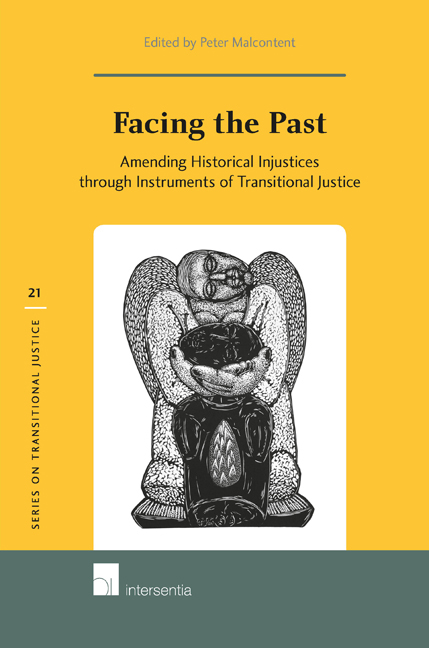Book contents
- Frontmatter
- Acknowledgements
- Contents
- PART I TRANSITIONAL JUSTICE. WHAT'S IN THE NAME?
- PART II RETRIBUTIVE JUSTICE
- Introduction
- Pacting the Law within Politics. Lessons from the International Criminal Court's First Investigations
- National and Hybrid Tribunals. Benefits and Challenges
- Beyond the Courtroom. The Objectives and Experiences of International Justice at the Grassroots
- From Gacaca to Mato Oput. Pragmatism and Principles in Employing Traditional Dispute Resolution Mechanisms
- Dealing with Organisations and Corporations
- PART III RESTORATIVE JUSTICE
- PART IV PENDING CASES
- Author Information
Introduction
from PART II - RETRIBUTIVE JUSTICE
Published online by Cambridge University Press: 15 December 2017
- Frontmatter
- Acknowledgements
- Contents
- PART I TRANSITIONAL JUSTICE. WHAT'S IN THE NAME?
- PART II RETRIBUTIVE JUSTICE
- Introduction
- Pacting the Law within Politics. Lessons from the International Criminal Court's First Investigations
- National and Hybrid Tribunals. Benefits and Challenges
- Beyond the Courtroom. The Objectives and Experiences of International Justice at the Grassroots
- From Gacaca to Mato Oput. Pragmatism and Principles in Employing Traditional Dispute Resolution Mechanisms
- Dealing with Organisations and Corporations
- PART III RESTORATIVE JUSTICE
- PART IV PENDING CASES
- Author Information
Summary
THE RISE OF INTERNATIONAL CRIMINAL JUSTICE
In the last decade of the twentieth century, almost fifty years after the establishment of ‘the mother of all international criminal tribunals’ – the International Military Tribunal of Nuremberg (IMT) – the popularity of criminal justice at the international level suddenly increased. Within the span of six years two international ad hoc tribunals were erected as a response to the atrocities committed during the war in the former Yugoslavia and the genocide in Rwanda. And in 1998 an international conference in Rome adopted the statute of a new independent and permanent International Criminal Court (ICC).
The idea of establishing an international tribunal to prosecute individual perpetrators of historical injustices was not new. Proposals in that direction were already made in the nineteenth century, for example by the International Committee of the Red Cross co-founder Gustav Moynier, who issued a public call for an international court as a means of protecting individuals from the horrors of war. At the end of World War I the idea of bringing to trial gross violators of ‘the laws of humanity’ gained a new momentum when the Allied Powers included provisions in the Peace Treaties of Versailles (with Germany) and Sevres (with the Ottoman Empire) that allowed for the prosecution of the major political and military leaders of the Central Powers. Especially the British and the French were keen on prosecuting the German Kaiser Wilhelm II to satisfy the masses’ desire for justice. In Belgium, France and Britain there was a great outcry for trying the ex-Emperor, who in the eyes of many personified the cause of a brutal and humanly costly war that had included the use of poison gas, U-boat sinking of passenger ships, zeppelin bombing attacks against cities and the deportation of more than sixty thousand Belgians for forced labour in Germany. The British, furthermore, insisted on the prosecution of the Ottoman leaders who had been responsible for the genocide against the Armenians in 1915, which had cost the lives of at least one million people.
- Type
- Chapter
- Information
- Facing the PastAmending Historical Injustices Through Instruments of Transitional Justice, pp. 59 - 90Publisher: IntersentiaPrint publication year: 2016



